It looks like you're using an Ad Blocker.
Please white-list or disable AboveTopSecret.com in your ad-blocking tool.
Thank you.
Some features of ATS will be disabled while you continue to use an ad-blocker.
share:
In 1853-1856, a coalition of the British, French, Ottoman empires and the Sardinian kingdom attacked the Russian Empire. The war was named
"Crimean".
Ottoman Empire: wanted to suppress the national liberation movement in the Balkans; the conquest of the Crimea and the Black Sea coast of the Caucasus.
England, France: hoped to undermine the international authority of Russia, weaken its position in the Middle East; to tear away from Russia the territories of Poland, Crimea, the Caucasus, Finland; to strengthen its position in the Middle East, using it as a sales market.
British squadrons attacked St. Petersburg in the Baltic. Arkhangelsk in the White Sea and Petropavlovsk in Kamchatka. If in the Baltic the squadron retreated without engaging in battle, frightened by powerful forts and coastal fortifications, then Arkhangelsk and Petropavlovsk withstood the siege of the fleet, the remnants of the squadrons retreated.
The main hostilities, characterized by great bloodshed, took place during the aggression in the Crimea. Both sides suffered colossal losses. The British have enough to remember the insane The Charge of the Light Brigade. The war ended with almost nothing, although Russia is believed to have lost. The coalition retreated on all fronts.
A large number of the wounded were evacuated by the British to Constantinople (now Istanbul) to the large military hospital of Scutari. Near the hospital, the British government bought land from Turkey for a cemetery, where dead soldiers and officers were buried. Now this cemetery is called "Haydar Pasha", and there are many graves with epitaphs preserved on it. Some I want to show you, my friends, with some of my comments.
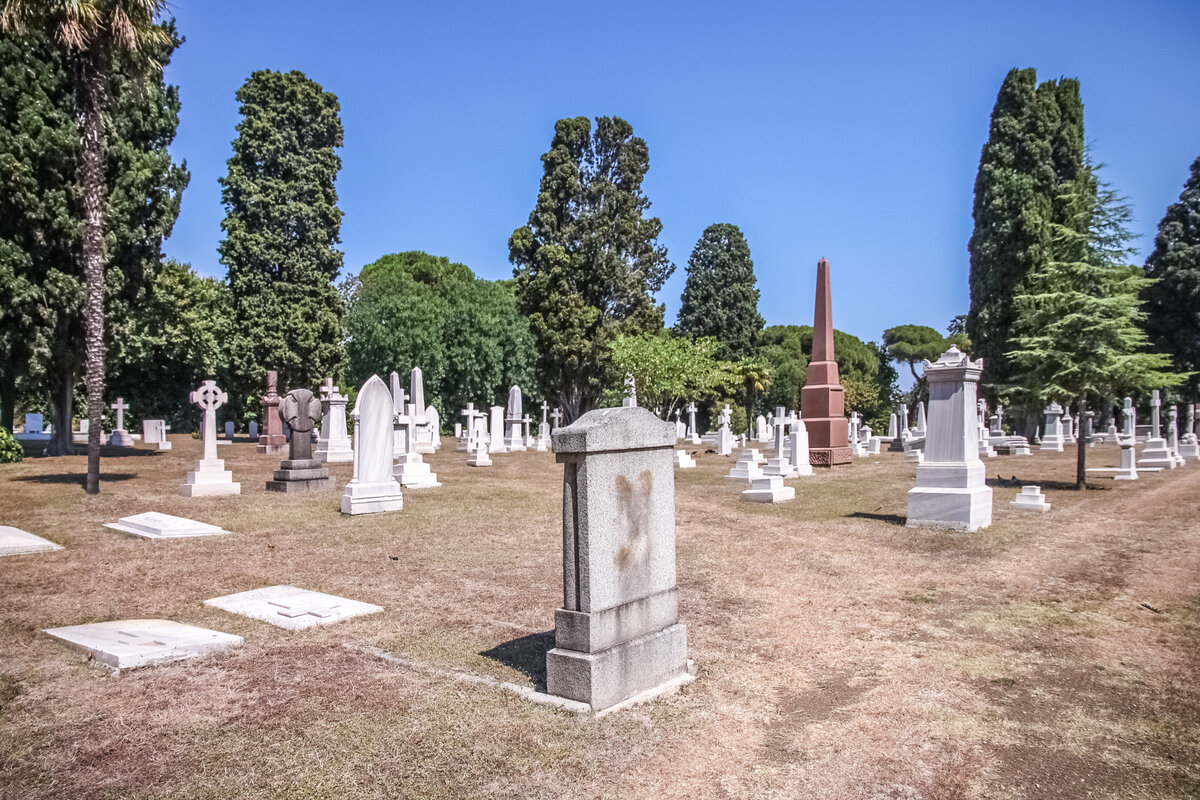
It is interesting how the aggressors justified and patriotically extolled the death of their soldiers in a foreign country. Although, at the same time, each grave said the opposite - about the unnecessary death of someone's son, brother or husband. Let's read these inscriptions.
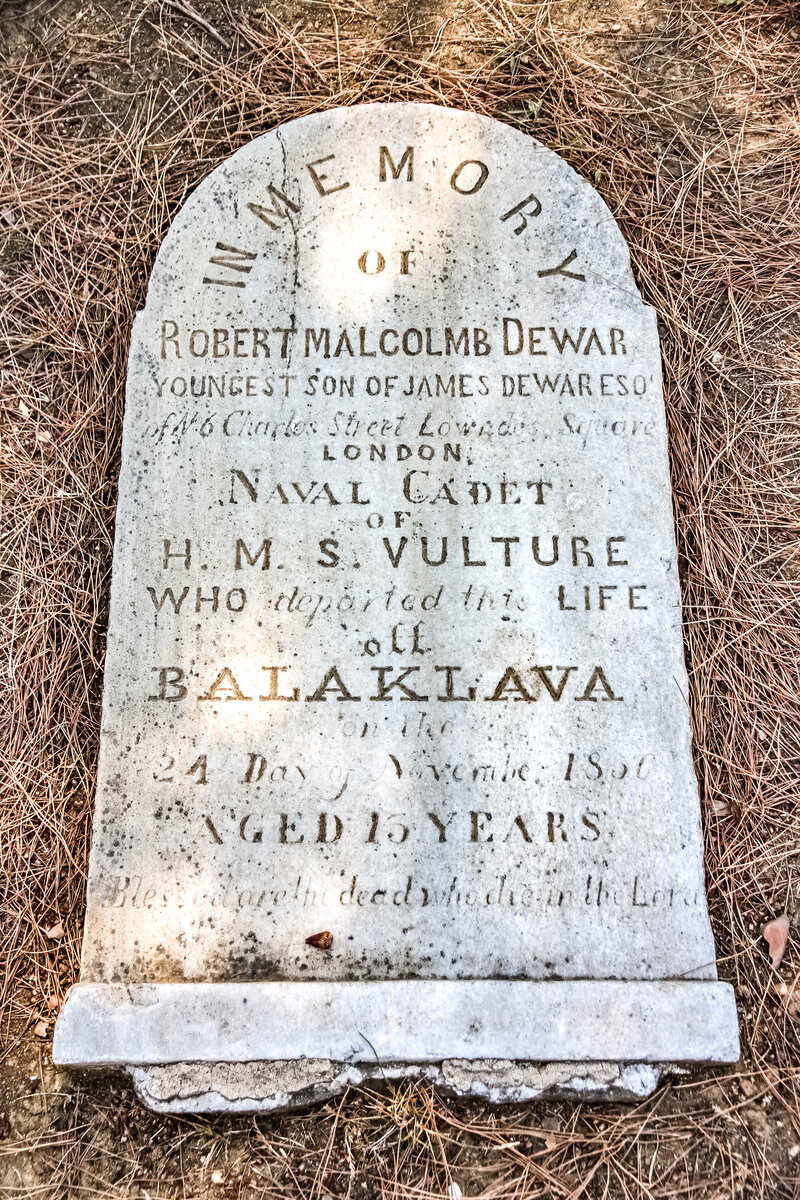
"In memory of Robert Malcolm Dewar, youngest son of James Dewar, Charles Street, Lowndes Square, London, cadet who passed away in Balaklava on November 24, 1856, at the age of 13. Blessed are the dead in the Lord."
As you can see, even teenagers from military schools were taken to the war. Robert was practically still a boy.
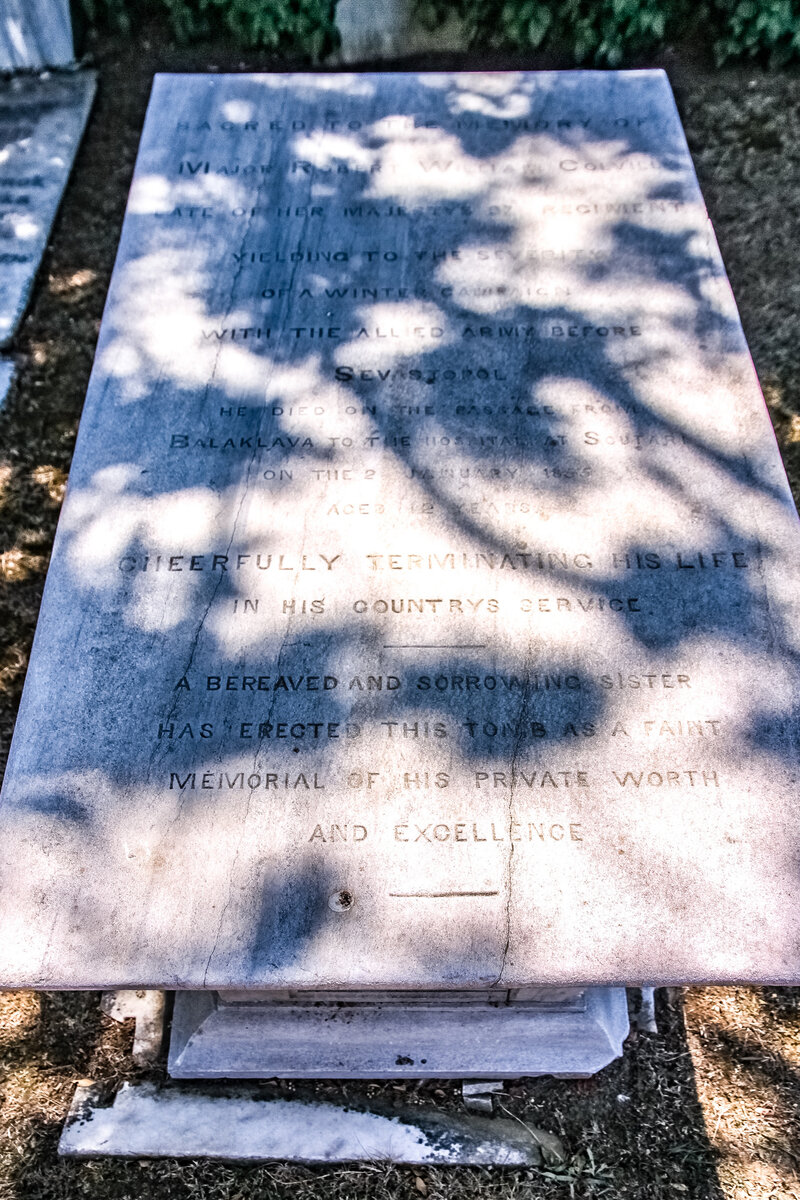
"To the sacred memory of Major Robert William Colville of Her Majesty's 97th Regiment. Who fell from the severity of the winter campaign with the allied army near Sevastopol. Died on January 2, 1855 on the transition from Balaklava to the hospital in Scutari at the age of 42, who readily ended his life in the service in her country. The grieving sister erected this tombstone as a faint reminder of his virtues and distinctions. "
Very high-flown words. The only thing missing is the mention of the defense of freedom and democracy. Here are some more examples.
"To the sacred memory of George Henry Hughes, the captain of the royal riflemen, who was forced to leave the hardships of the siege of Sevastopol due to illness, from which he died in Constantinople on December 11, 1854 at the age of 28 years. This stone was erected by his brothers-officers."
Many inscriptions use biblical quotations, another bizarre excuse for actions that are definitely questionable in terms of virtue. For example, a similar one is used on another grave.
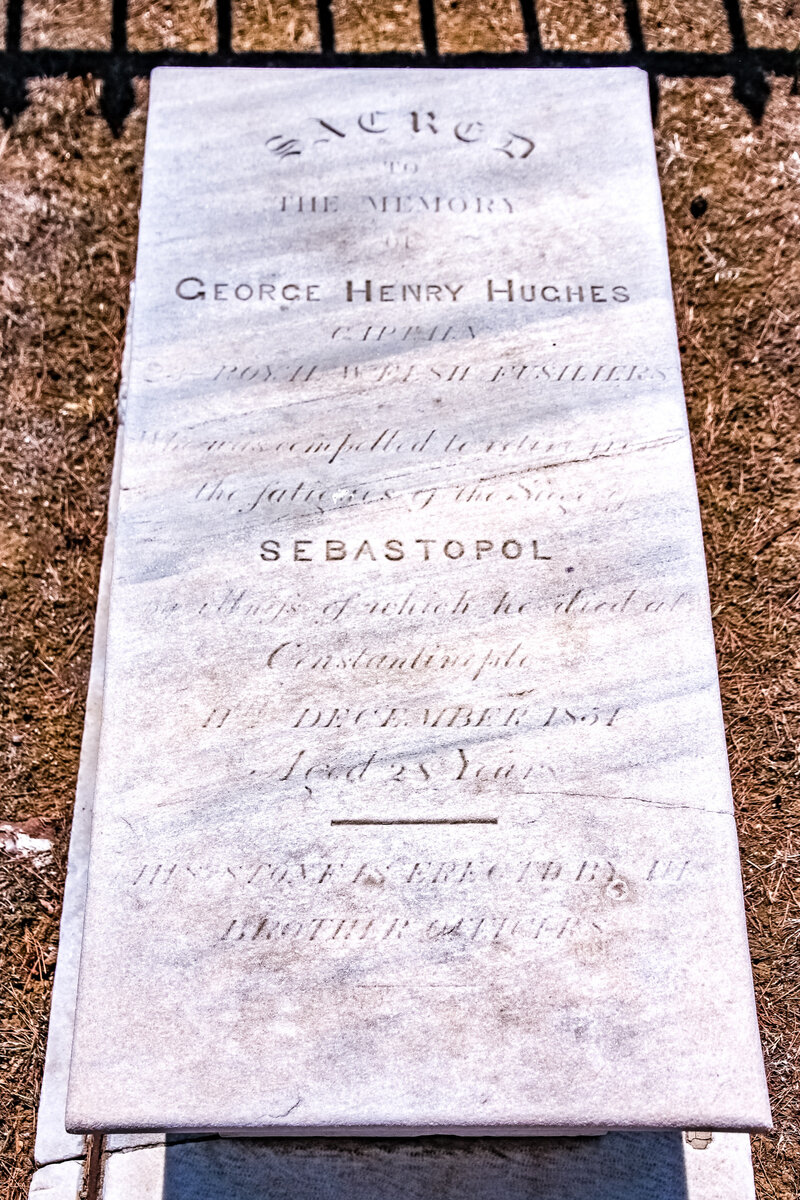
"In memory of Nathaniel Evanson Harisson, Lieutenant Colonel of the British Army, who died near Sevastopol on August 12, 1855 at the age of 42. All those who knew his courageous and Christian character, his devotion to service are deeply grieved." Fight the good fight of faith "1 Timothy 6 :12."
Only in the Bible it is about faith, but here the context has already been distorted.
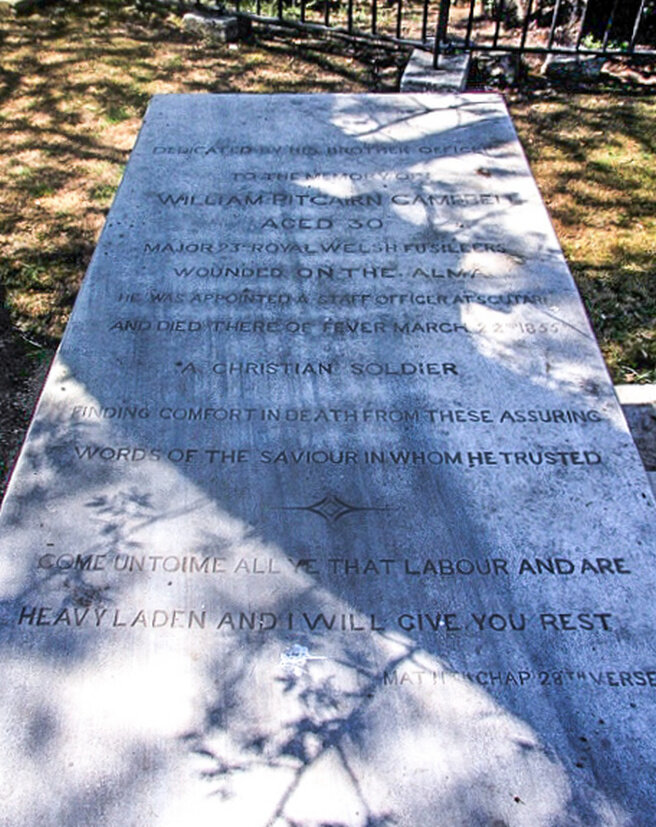
From Brothers Officers in memory of William Pitcairn Campbell, Major of the Royal Riflemen, 30, wounded by the Alma River and sent to Scutari, where he died of a fever on March 22, 1855. The Christian warrior found peace in death, believing in the Savior's words: “Come to me, all you who are weary and burdened, and I will give you rest” (Matthew 11:28).
But there is also one very mysterious slab, clearly Russian.
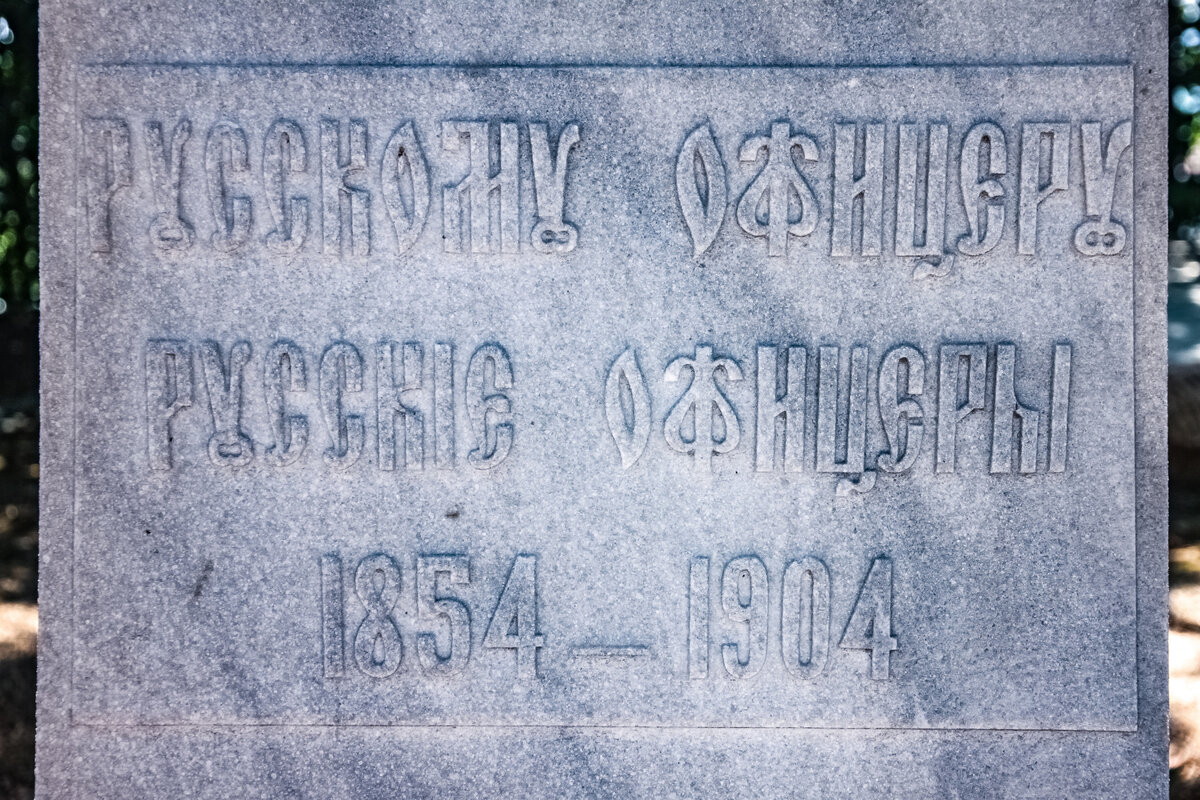
The old Russian spelling says: "Russian officers to a Russian officer. 1854 - 1904".
There is no information about him. There were even inquiries to the British War Burial Commission, which manages the Haydar Pasha cemetery. Obviously, the tombstone was installed by Russian veterans of the Crimean War on the 50th anniversary. But to whom did they dedicate it in the English cemetery? My guess is that the British also took Russian prisoners of war to Constantinople, who also found their last refuge here.
Thanks.
Ottoman Empire: wanted to suppress the national liberation movement in the Balkans; the conquest of the Crimea and the Black Sea coast of the Caucasus.
England, France: hoped to undermine the international authority of Russia, weaken its position in the Middle East; to tear away from Russia the territories of Poland, Crimea, the Caucasus, Finland; to strengthen its position in the Middle East, using it as a sales market.
British squadrons attacked St. Petersburg in the Baltic. Arkhangelsk in the White Sea and Petropavlovsk in Kamchatka. If in the Baltic the squadron retreated without engaging in battle, frightened by powerful forts and coastal fortifications, then Arkhangelsk and Petropavlovsk withstood the siege of the fleet, the remnants of the squadrons retreated.
The main hostilities, characterized by great bloodshed, took place during the aggression in the Crimea. Both sides suffered colossal losses. The British have enough to remember the insane The Charge of the Light Brigade. The war ended with almost nothing, although Russia is believed to have lost. The coalition retreated on all fronts.
A large number of the wounded were evacuated by the British to Constantinople (now Istanbul) to the large military hospital of Scutari. Near the hospital, the British government bought land from Turkey for a cemetery, where dead soldiers and officers were buried. Now this cemetery is called "Haydar Pasha", and there are many graves with epitaphs preserved on it. Some I want to show you, my friends, with some of my comments.

It is interesting how the aggressors justified and patriotically extolled the death of their soldiers in a foreign country. Although, at the same time, each grave said the opposite - about the unnecessary death of someone's son, brother or husband. Let's read these inscriptions.

"In memory of Robert Malcolm Dewar, youngest son of James Dewar, Charles Street, Lowndes Square, London, cadet who passed away in Balaklava on November 24, 1856, at the age of 13. Blessed are the dead in the Lord."
As you can see, even teenagers from military schools were taken to the war. Robert was practically still a boy.

"To the sacred memory of Major Robert William Colville of Her Majesty's 97th Regiment. Who fell from the severity of the winter campaign with the allied army near Sevastopol. Died on January 2, 1855 on the transition from Balaklava to the hospital in Scutari at the age of 42, who readily ended his life in the service in her country. The grieving sister erected this tombstone as a faint reminder of his virtues and distinctions. "
Very high-flown words. The only thing missing is the mention of the defense of freedom and democracy. Here are some more examples.
"To the sacred memory of George Henry Hughes, the captain of the royal riflemen, who was forced to leave the hardships of the siege of Sevastopol due to illness, from which he died in Constantinople on December 11, 1854 at the age of 28 years. This stone was erected by his brothers-officers."
Many inscriptions use biblical quotations, another bizarre excuse for actions that are definitely questionable in terms of virtue. For example, a similar one is used on another grave.

"In memory of Nathaniel Evanson Harisson, Lieutenant Colonel of the British Army, who died near Sevastopol on August 12, 1855 at the age of 42. All those who knew his courageous and Christian character, his devotion to service are deeply grieved." Fight the good fight of faith "1 Timothy 6 :12."
Only in the Bible it is about faith, but here the context has already been distorted.

From Brothers Officers in memory of William Pitcairn Campbell, Major of the Royal Riflemen, 30, wounded by the Alma River and sent to Scutari, where he died of a fever on March 22, 1855. The Christian warrior found peace in death, believing in the Savior's words: “Come to me, all you who are weary and burdened, and I will give you rest” (Matthew 11:28).
But there is also one very mysterious slab, clearly Russian.

The old Russian spelling says: "Russian officers to a Russian officer. 1854 - 1904".
There is no information about him. There were even inquiries to the British War Burial Commission, which manages the Haydar Pasha cemetery. Obviously, the tombstone was installed by Russian veterans of the Crimean War on the 50th anniversary. But to whom did they dedicate it in the English cemetery? My guess is that the British also took Russian prisoners of war to Constantinople, who also found their last refuge here.
Thanks.
a reply to: RussianTroll
Hey...I had no idea you were into this kind of stuff.
Let me get you some gravestones of the passengers of flight MH-17.
Hey...I had no idea you were into this kind of stuff.
Let me get you some gravestones of the passengers of flight MH-17.
originally posted by: alldaylong
a reply to: RussianTroll
Can you not let the dead rest in peace ?
Very bad form.
The Russians have a proverb: "He who does not know his past has no future."
a reply to: RussianTroll
It's all old history and it happen decades ago.
LIve and let live.
All governments did bad stuff back in the day and arguably big business is still steering them these ways today.
Watched a TV show last night about Chile. British did a genocide on the natives there in 19thC and wiped out every single population. It's news to me but that was the ways of the world back then. Bet you guys did the same to the Tatars, Stan Republics, Alaskans too back in the .day
Sh*t happens Ruskie Troll............ Live with it
It's all old history and it happen decades ago.
LIve and let live.
All governments did bad stuff back in the day and arguably big business is still steering them these ways today.
Watched a TV show last night about Chile. British did a genocide on the natives there in 19thC and wiped out every single population. It's news to me but that was the ways of the world back then. Bet you guys did the same to the Tatars, Stan Republics, Alaskans too back in the .day
Sh*t happens Ruskie Troll............ Live with it
originally posted by: keukendeur
a reply to: RussianTroll
Hey...I had no idea you were into this kind of stuff.
Let me get you some gravestones of the passengers of flight MH-17.
Bring them to the CIA headquarters in Virginia and the parliament in Kiev.
originally posted by: RussianTroll
a reply to: ufoorbhunter
Bet accepted! For a box of bourbon?
Prefer a Vostok 1967
I, for one, always enjoy your posts, RussianTroll. This newest post is a window on the past. BTW, this what should be on every military tombstone:
Isaiah 2:4 "And he shall judge among the nations, and shall rebuke many people: and they shall beat their swords into plowshares, and their spears
into pruninghooks: nation shall not lift up sword against nation, neither shall they learn war any more."
originally posted by: ufoorbhunter
originally posted by: RussianTroll
a reply to: ufoorbhunter
Bet accepted! For a box of bourbon?
Prefer a Vostok 1967
Unfortunately, I do not know of such a drink
originally posted by: Lazarus Short
I, for one, always enjoy your posts, RussianTroll. This newest post is a window on the past. BTW, this what should be on every military tombstone: Isaiah 2:4 "And he shall judge among the nations, and shall rebuke many people: and they shall beat their swords into plowshares, and their spears into pruninghooks: nation shall not lift up sword against nation, neither shall they learn war any more."
Thanks. I agree with you!
a reply to: RussianTroll
You ignore the fact that the first move in the war was the Russian invasion of Moldavia and Wallachia (i.e modern Rumania). That is like explaining the Second World War in terms of Stalin's attack on Hitler, and ignoring the original German invasion of Poland.
Here is another way of explaining it (this film would not have got past Soviet censorship at the time);
You ignore the fact that the first move in the war was the Russian invasion of Moldavia and Wallachia (i.e modern Rumania). That is like explaining the Second World War in terms of Stalin's attack on Hitler, and ignoring the original German invasion of Poland.
Here is another way of explaining it (this film would not have got past Soviet censorship at the time);
a reply to: alldaylong
Huh, is knowing history very bad form? Did he insult the dead? What’s bad form?
Huh, is knowing history very bad form? Did he insult the dead? What’s bad form?
a reply to: DISRAELI
Russia freed the Slavic peoples from Turkish slavery.
What were Britain, France and Turkey doing there? In Crimea, St. Petersburg and Petropavlovsk?
Forgot about the kingdom of Sardinia ...))))
Russia freed the Slavic peoples from Turkish slavery.
What were Britain, France and Turkey doing there? In Crimea, St. Petersburg and Petropavlovsk?
Forgot about the kingdom of Sardinia ...))))
edit on 10-9-2021 by RussianTroll because: Add
a reply to: RussianTroll
That first gravestone look like 15 not 13 years old to me, either way it’s very young. Crimea was known as the bloody war where Florence nightingale became famed if memory serves. I’ll have to check my history book I wonder how differently it will read to yours?
That first gravestone look like 15 not 13 years old to me, either way it’s very young. Crimea was known as the bloody war where Florence nightingale became famed if memory serves. I’ll have to check my history book I wonder how differently it will read to yours?
originally posted by: surfer_soul
a reply to: RussianTroll
That first gravestone look like 15 not 13 years old to me, either way it’s very young. Crimea was known as the bloody war where Florence nightingale became famed if memory serves. I’ll have to check my history book I wonder how differently it will read to yours?
Maybe 15, it's hard to make out. Anyway, he is very young for the war.
Interpretations can be different. We in Russia believe that the predecessors of NATO and the European Union again (after Napoleon) invaded Russia. Is not it?
originally posted by: surfer_soul
a reply to: alldaylong
Huh, is knowing history very bad form? Did he insult the dead? What’s bad form?
Inscriptions written on grave stones where not put there by the people buried beneath them. Is that difficult for you to understand ?
Obviously it is.
originally posted by: alldaylong
a reply to: RussianTroll
Can you not let the dead rest in peace ?
Very bad form.
The dead are dead. I doubt that the "peace" of anyone featured in this OP was in the last disturbed by the mention of his name.
a reply to: RussianTroll
By the same token, what were the Russian troops doing entering Berlin in 1945? Anyone can ask that question if he leaves out the story of how the war started.
The Russian invasion of the Balkan provinces was still the beginning of the war, so you're not telling the full story if you leave it out.
How do you think "Russia" came into existence in the first place? It was by the rulers of Moscow attacking and taking over other states.
How were the Moscovites entitled to attack and conquer the free republic of Novgorod? If you want to start grieving about "aggression", there is a thousand years of history of Russian aggression towards others that can be told if we make an effort.
By the same token, what were the Russian troops doing entering Berlin in 1945? Anyone can ask that question if he leaves out the story of how the war started.
The Russian invasion of the Balkan provinces was still the beginning of the war, so you're not telling the full story if you leave it out.
How do you think "Russia" came into existence in the first place? It was by the rulers of Moscow attacking and taking over other states.
How were the Moscovites entitled to attack and conquer the free republic of Novgorod? If you want to start grieving about "aggression", there is a thousand years of history of Russian aggression towards others that can be told if we make an effort.
edit on 10-9-2021 by DISRAELI because: (no reason given)
a reply to: alldaylong
No it was done by the people who cared for them.’ In loving memory’ gives us a clue
No it was done by the people who cared for them.’ In loving memory’ gives us a clue
new topics
-
Mike Tyson returns 11-15-24
World Sports: 4 hours ago -
HHS Spent Hundreds of Millions of Dollars on DEI Initiatives Under Biden, Watchdog Finds
US Political Madness: 5 hours ago -
Breaking: FBI Agents Raid Polymarket CEO After Betting Site Predicts Trump Win
General Conspiracies: 5 hours ago -
The Guardian quits Elon Musk's X social media platform
Mainstream News: 6 hours ago -
Thune selected as Senate Republican Leader
US Political Madness: 8 hours ago -
Band of Brothers 2001 Classic
Television: 8 hours ago -
US warship Edsall Lost after Pearl Harbor Attack Found 80 Years Later ... by Accident
Mainstream News: 9 hours ago -
WATCH LIVE: US Congress hearing on UFOs, unidentified anomalous phenomena
Aliens and UFOs: 11 hours ago -
Worlds Behind You…
Short Stories: 11 hours ago -
Con Man Don
Jokes, Puns, & Pranks: 11 hours ago
top topics
-
Breaking: FBI Agents Raid Polymarket CEO After Betting Site Predicts Trump Win
General Conspiracies: 5 hours ago, 18 flags -
How can you defend yourself when the police will not tell you what you did?
Posse Comitatus: 15 hours ago, 17 flags -
The Guardian quits Elon Musk's X social media platform
Mainstream News: 6 hours ago, 15 flags -
US warship Edsall Lost after Pearl Harbor Attack Found 80 Years Later ... by Accident
Mainstream News: 9 hours ago, 13 flags -
Thune selected as Senate Republican Leader
US Political Madness: 8 hours ago, 13 flags -
HHS Spent Hundreds of Millions of Dollars on DEI Initiatives Under Biden, Watchdog Finds
US Political Madness: 5 hours ago, 10 flags -
Band of Brothers 2001 Classic
Television: 8 hours ago, 7 flags -
WATCH LIVE: US Congress hearing on UFOs, unidentified anomalous phenomena
Aliens and UFOs: 11 hours ago, 7 flags -
Worlds Behind You…
Short Stories: 11 hours ago, 4 flags -
Mike Tyson returns 11-15-24
World Sports: 4 hours ago, 2 flags
active topics
-
US warship Edsall Lost after Pearl Harbor Attack Found 80 Years Later ... by Accident
Mainstream News • 12 • : CosmicFocus -
Thune selected as Senate Republican Leader
US Political Madness • 66 • : CriticalStinker -
The Trump effect 6 days after 2024 election
2024 Elections • 104 • : NoCorruptionAllowed -
President-Elect Donald Trump will Meet with Coup-Victim JOE BIDEN on Wed 11.13.2024.
2024 Elections • 31 • : WeMustCare -
Trump picks Gov. Kristi Noem to serve as homeland security secretary
2024 Elections • 35 • : xuenchen -
Speaker Johnson Orders Entire Biden Administration to Preserve and Retain All Records - Documents
US Political Madness • 69 • : 777Vader -
Mike Tyson returns 11-15-24
World Sports • 7 • : Hypntick -
Should we look for the truth, or just let it go?
US Political Madness • 102 • : chr0naut -
The Guardian quits Elon Musk's X social media platform
Mainstream News • 14 • : Dandandat3 -
Elon's Starlink Stole The Election For Trump--Leftist Conspiracy Theorists Charge
General Conspiracies • 33 • : 777Vader
